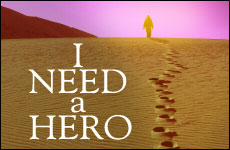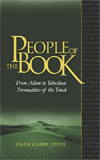 Iran’s Attack on Israel
Iran’s Attack on Israel


8 min read
In search of a Jewish hero.
Starting from the dawn of time, man has -- across societies and civilizations -- searched for the ideal hero to shape his world and to fire his imagination.
There are mythological heroes such as the Greek warrior Achilles; legendary figures like King Arthur and the Knights of the Round Table; famous historical personalities like Abraham Lincoln; popular folk-heroes like William Tell; great literary characters and last, but by no means least, comic-book superheroes such as Spider-man.
From ancient times to present each era produces its fair share of heroes and heroines. Ranging from leaders and revolutionaries to visionaries and pioneers, from inventors and innovators to icons and entertainers -- the pursuit of the "hero" is a constant venture. In fact, Time magazine annually features its choice of heroes with its "100 most influential living people" issue (albeit an issue that is fiercely debated in future editions by its readership!).
The reason for the existence of heroes can be explained with the truism, "Show me your hero and I will show you who you are."
Who I admire speaks volumes about what makes me tick.
Who I admire speaks volumes about what makes me tick. The response to the question, "Who is your hero?" provides a psychological mirror into one's soul. In other words, my hero is the image of how I want to see myself and the projection of how I want to conduct my life.
It does not mean that I should idolize or worship him; he is human and fallible, after all. Still, who I choose as my hero is of major significance. Whether he likes it or not, my human paradigm is charged with the daunting task of being my inspiration! He is the living embodiment of the virtues and values that I myself want to emulate. So I hope and pray that he dare not let me down.
Heroes of Modernity
Typically Western society honors the beautiful, the rich and the famous. Showbiz celebrities, entrepreneurs and sports personalities are crowned with iconic status and worshipped by the masses.
But where our culture tries to convince us that looks, fame and fortune are values worth pursuing, a study of such archetypes and their personal lives paints a very different picture. Their volatile and fragile relationships, forever aired in the public eye, are a sight for sore eyes. In spite of their affluence and public adulation, their struggles with depression, alcohol or drug addictions stress how lasting happiness eludes them.
Moreover their heroic acclaim as a "star" is not a true representation of who they are as a "person."
It is not talent or success that is the makings of a hero; it has to be something deeper. It has to identify the person's essence and ness as a human being.
In the trail for distinctive "Jewish" heroes then, I should be searching for someone whose being as a person reflects and incorporates genuine Jewish values.
Who am I to turn to? What are the timeless qualities that "Jewish" heroes offer the 21st century Jew?
Oldest in the ‘Book'
The best Jewish heroes are, in fact, the oldest ones ‘in the book' (pun intended).
The biblical personalities, whose lives are immortalized in the Books of the Torah, are the definitive Jewish heroes; timeless personification of what it means to be a Jew.
Strangely, the Bible, as the book that primarily records Jewish Law, makes for an unusual legal text. No other judicial code is quite like it. The timeless laws of living are integrated and interwoven into the dramatic lives of the biblical personalities. What this magnificently teaches is how the laws of Jewish living and the lives of the Jewish biblical heroes are interdependent.
The beautiful ideals of Judaism are inseparable from the Jewish personality. What the Jew does is expressive of who he is. And who better to illustrate this then the "People of the Book." Hence it is the characters inhabiting the pages of the Torah that are themselves the living embodiment of the Jewish nation's legacy. In this sense the "people" are reflective of the "book".
It is the wonderful spectrum of biblical characters, spiritual giants and flawed individuals that vividly capture the contrasting virtues for a meaningful, beautiful life. The Jewish patriarchs and matriarchs, kings and leaders, enemies and foes, villains and sinners are all included. Stories of their strengths, weaknesses and failings are repeatedly studied in the weekly Torah portion. Their lives are sacredly revered as the timeless template for mankind in each and every generation. They heroically illustrate how my Jewish identity will relate to Jewish values.
Heroes of the Jewish Spirit
The Jewish take on the quality of strength is the inner fortitude to battle against one's inclination.
Jewish heroes need not be endowed with physical strength, good looks, wealth or fame. These are temporal matters that do not tell us about the "essence" of the individual. In fact, the Jewish take on the quality of strength is the inner fortitude to battle against one's inclination; the true definition of wealth is inner happiness; and true wisdom is not an Ivy League degree but the premeditated ability to act with an eye fixed on the future.
Typical Jewish values are mirrored in the deportment of its timeless heroes. The heroic trait of humility is preferred to self-aggrandizement. The sincere good deed executed in private is far more worthy than token public gestures. Zealousness triumphs over laziness as is generosity over stinginess. Honesty and integrity in interpersonal actions is the norm. Fear of God is more real than fearing one's peers; doing what is right is victorious over doing what is popular.
Here are some portraits of biblical heroes that elegantly embody this set of values:
Historically the Jew is the model for all the other nations of how to live. His observance of the divine commandments means that he is expected to be the embodiment of the greatest virtues to be found in humanity.
He is the hero.
In turn, his heroes are the timeless "heroes" which have, over the generations, stood the test of time; whose lives and values can indeed be the model for our own because they underlie his rich Jewish heritage.
It is especially these Jewish heroes that can inspire us to become the best that we can be.
 OSHER CHAIM LEVENE is author of the newly released "People of the Book: Personalities of the Torah" (Targum Press: 2007). (Click to order). His first book was "Set in Stone: The Meaning of Mitzvah Observance" (Targum Press: 2004). A graduate of Gateshead and Mir Yeshivot, he holds a Bachelor of Science (Honors) business degree from London's City University and current writes a popular e-mail class "The Living Law" for the Project Genesis website.
OSHER CHAIM LEVENE is author of the newly released "People of the Book: Personalities of the Torah" (Targum Press: 2007). (Click to order). His first book was "Set in Stone: The Meaning of Mitzvah Observance" (Targum Press: 2004). A graduate of Gateshead and Mir Yeshivot, he holds a Bachelor of Science (Honors) business degree from London's City University and current writes a popular e-mail class "The Living Law" for the Project Genesis website.
